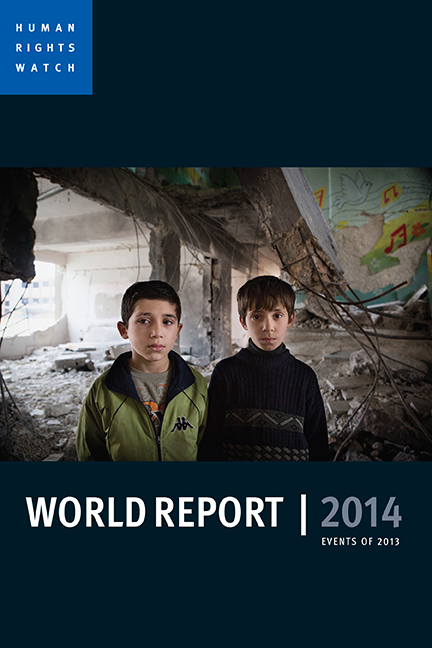Book contents
- Frontmatter
- Dedication
- HUMAN RIGHTS WATCH
- Table of Contents
- Foreword
- Rights Struggles of 2013: Stopping Mass Atrocities, Majority Bullying, and Abusive Counterterrorism
- The Human Rights Case for Drug Reform How Drug Criminalization Destroys Lives, Feeds Abuses, and Subverts the Rule of Law
- Putting Development to Rights: Integrating Rights into a Post-2015 Agenda
- The Right Whose Time Has Come (Again) Privacy in the Age of Surveillance
- Photo Essays
- AFRICA
- AMERICAS
- ASIA
- EUROPE AND CENTRAL ASIA
- MIDDLE EAST AND NORTH AFRICA
- UNITED STATES AND CANADA
- 2013 HUMAN RIGHTS WATCH PUBLICATIONS
- Acknowledgments
Democratic Republic of Congo
Published online by Cambridge University Press: 07 May 2022
- Frontmatter
- Dedication
- HUMAN RIGHTS WATCH
- Table of Contents
- Foreword
- Rights Struggles of 2013: Stopping Mass Atrocities, Majority Bullying, and Abusive Counterterrorism
- The Human Rights Case for Drug Reform How Drug Criminalization Destroys Lives, Feeds Abuses, and Subverts the Rule of Law
- Putting Development to Rights: Integrating Rights into a Post-2015 Agenda
- The Right Whose Time Has Come (Again) Privacy in the Age of Surveillance
- Photo Essays
- AFRICA
- AMERICAS
- ASIA
- EUROPE AND CENTRAL ASIA
- MIDDLE EAST AND NORTH AFRICA
- UNITED STATES AND CANADA
- 2013 HUMAN RIGHTS WATCH PUBLICATIONS
- Acknowledgments
Summary
Armed conflict continued in eastern Democratic Republic of Congo, with Congolese security forces and non-state armed groups responsible for serious abuses against civilians. The Rwandan-backed M23 armed group committed widespread war crimes, including summary executions, rapes, and forced recruitment of children. As the military focused attention on defeating the M23, many other armed groups also attacked civilians.
In the capital, Kinshasa, and elsewhere, government authorities have sought to silence dissent with threats, violence, and arbitrary arrests against human rights activists, journalists, and opposition political party leaders and supporters who were critical of government officials or participated in anti-government demonstrations.
In March, M23 leader and former Congolese military commander Bosco Ntaganda surrendered to the United States embassy in Rwanda. He is awaiting trial at the International Criminal Court (ICC) on charges of war crimes and crimes against humanity committed in northeastern Congo in 2002 and 2003. One of the region's most brutal warlords, Ntaganda commanded forces that terrorized civilians for the past decade.
Abuses by the Security Forces
When government soldiers fled the M23's advance on the eastern city of Goma in late November 2012, they went on a rampage and raped at least 76 women and girls in and around the town of Minova, South Kivu. In Kitchanga, North Kivu, soldiers from the 812th Regiment, allied with a Tutsi militia they had armed, clashed with a primarily ethnic Hunde armed group in late February through early March. At least 25 civilians died in the fighting. Many of the civilians killed were Hunde who appear to have been targeted by soldiers because of their ethnicity. Security forces also deliberately killed civilians during operations against Mai Mai fighters in Katanga province.
Military and intelligence officials detained many former M23 fighters and alleged collaborators for several weeks without bringing them before a court, often incommunicado and in harsh conditions.
War Crimes by M23 Rebels
During their occupation of Goma and nearby areas in late November 2012, M23 fighters summarily executed at least 24 people, raped at least 36 women and girls, looted hundreds of homes, offices, and vehicles, and forcibly recruited soldiers and medical officers, police, and civilians into their ranks. The M23 withdrew from Goma on December 1 when the government agreed to start peace talks in Kampala, Uganda.
- Type
- Chapter
- Information
- World Report 2014Events of 2013, pp. 103 - 107Publisher: Bristol University PressPrint publication year: 2014



